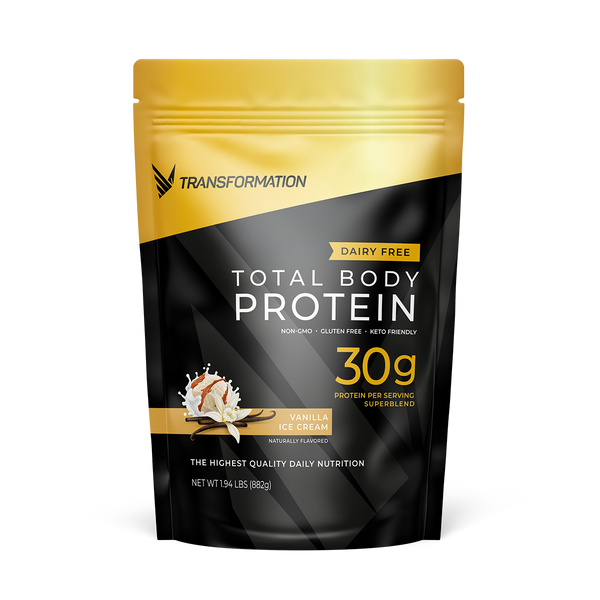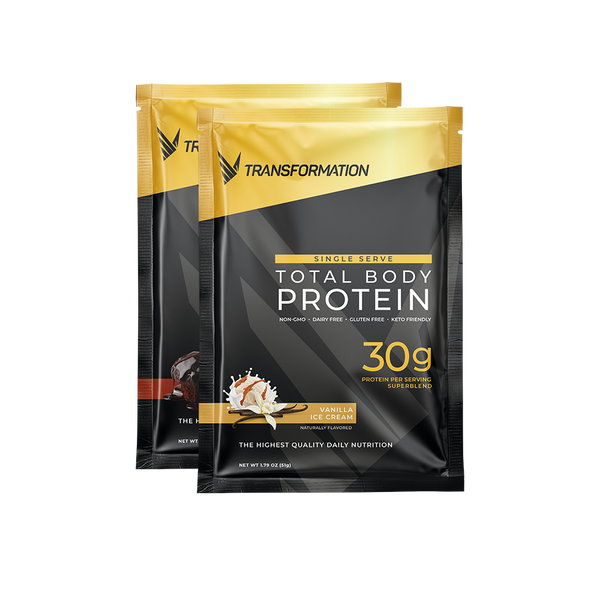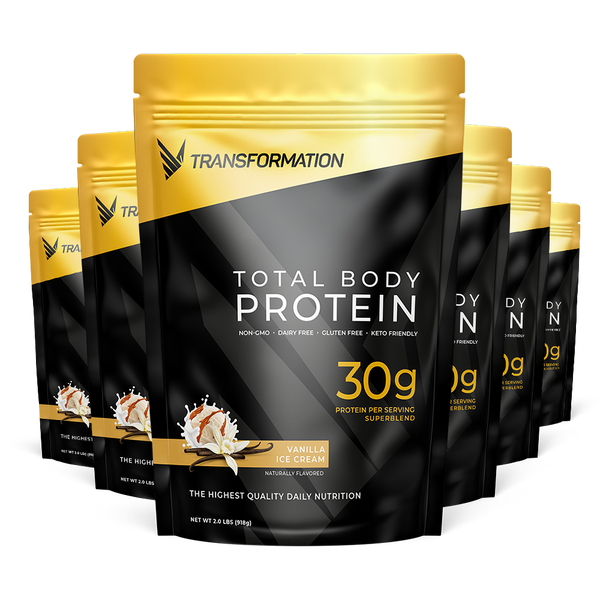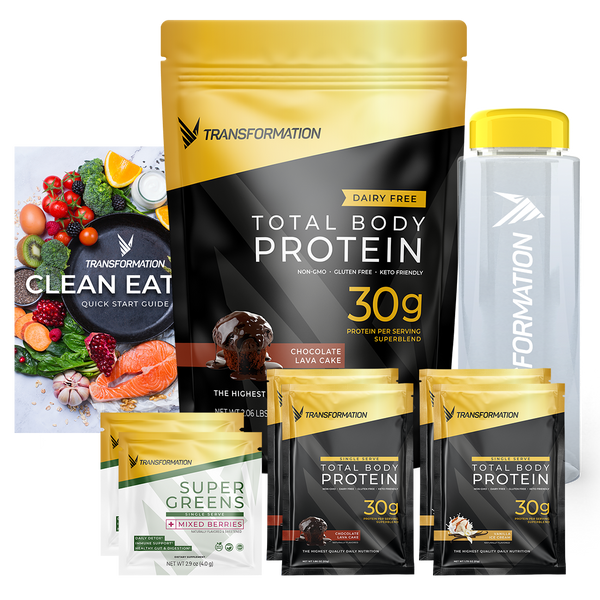
8 Reasons to Choose a Dairy-Free Protein Powder
What Is Dairy-Free Protein Powder?
A dairy-free protein powder is a protein powder is basically one that doesn’t use dairy-based protein as the main protein source. Dairy foods contain two major forms of protein: whey and casein. Perhaps one of the most popular forms of dairy protein you may be familiar with is whey protein. Whey is sourced during the cheese-making process. After a cow’s milk passes quality tests, enzymes are added to separate the curd from the liquid whey. The liquid whey is then pasteurized to isolate and compound the protein. This is the primary protein source for most powders, and the fact that it's derived from cows makes it considered a dairy protein. Whey is the main ingredient in most dairy proteins.
Dairy-free proteins are those that do not contain whey, casein or cow’s milk in any form. Most dairy-free protein powders are vegetarian-friendly, they aren’t necessarily vegan compliant. This is because they may still include egg-based protein. While cow’s milk products can be a great way to get protein, they can also sometimes have sneaky side effects.
Many people are allergic to dairy or have some form of lactose intolerance, some may not even realize it. If you have it, your body doesn’t digest milk properly, which can lead to all sorts of gut problems, including bloating, constipation, diarrhea, and gas. If you’ve ever felt out of sorts after a big meal of cheese or dairy you may want to re-think how you are getting your protein, and opt to do less dairy.
8 No-Brainer Reasons to Choose a Dairy-Free Protein Powder
Back in the early ages of developing plant protein, there was a lot of criticism about them not being as tasty, losing out on that “creamy” texture. However, food science has expanded leaps and bounds in the last few decades, and now its easy to get great tasting protein from all kinds of sources! There’s never been a better time to switch to a dairy-free protein powder. There are so many benefits of plant based protein powder, and advantages of plant based protein powder. Read on for reasons and ways you can make the switch.
1. Easy to Digest
- Dairy-free protein can be much easier to digest than whey alternatives
- Ideal for people with food allergies/sensitivities to lactose
- Won’t cause bloating or GUT issues
2. Nutrient-Dense
- Dairy-free protein offers a complete nutrient profile that can often make up for deficiencies in your diet:
- Dairy-free and plant-based protein powders are often more nutrient-dense and complete than their whey counterparts
- Some studies have even shown that switching your protein sources from animal to plant-based can help reduce inflammation in the body
3. Lower Calorie Alternative to Whey
- Plant-based protein can offer a complete protein source, often with a lower calorie count per serving!
- If one of your fitness goals is to lose weight/body fat and gain more lean muscle, plant-based protein can be the ideal source of protein supplementation.
- Typically, plant-based proteins contain fewer calories per serving but still offer the amount of protein that you need to gain muscle.
4. Can Help Reduce Bloat
- Switching to a plant-based protein can help reduce bloating
- Bloating can be a sign of a dietary sensitivity
- Often dismissed as just part of everyday life for athletes/fitness enthusiasts who consume whey protein.
- With plant-based protein, you’re much less likely to experience the typical bloating (from whey), because it doesn’t include lactose-based ingredients
- You can also find plant-based proteins that are free from soy or other food allergy-related ingredients

5. Protein Rotation Is Good for You
- Mixing up your protein routine can be beneficial for your body & your progress.
- Dietary repetition isn’t necessarily good for you:
- It can lead to the development of dietary sensitivities/allergies.
- Your body can also acclimate to it, which can reduce the efficacy.
- Switching from animal-based to plant-based protein offers dietary diversity that can help boost lean muscle growth.
6. Better for the Environment
- Plant-based proteins are much more environmentally friendly to produce.
- Whey protein is derived from cow’s milk, which contributes to the demand for beef.
- But raising cattle - especially without hormones, antibiotics, and grass-fed - can take a toll on environmental resources (such as water) and significantly contributes to global greenhouse gas emissions.
- Switching to a plant-based protein is much more environmentally friendly.
- It helps conserve water by using fewer resources to product.
- It helps reduce greenhouse gas emissions
- Plants helps remove CO2 from the atmosphere.
7. Hormone & Antibiotic-Free
- Switching to a dairy-free protein means it’s easier to avoid the hormones and antibiotics that are typically involved with dairy-based protein.
- Because the volume of whey protein consumption has skyrocketed in the last few decades, protein powder manufacturers often turn to using hormones & antibiotics on their cattle to keep up with the demand
- Dairy-free proteins offer a cleaner source of protein
- You don’t have to worry about hormones and antibiotics with dairy-free protein powder
8. Improved Cardiovascular Health
- Switching to a dairy-free protein powder can help boost your cardiovascular health.
- Studies on the efficacy of plant-based proteins have shown multiple cardiovascular benefits
- Lower cholesterol
- Lower chronic inflammation
- Lower risk of cardiovascular diseases
- Examples
- Heart disease
- Diabetes
- Stroke
Boost Your Health & Fitness with Dairy-Free Protein Powder
Dairy-free protein powders are simply protein powders without lactose-based ingredients. There are many benefits to switching to a dairy-free protein powder. Plus they can boost your metabolism. There are many benefits of going dairy-free. Some dairy-based products have also been shown to increase inflammation in the body. This may contribute to health conditions from cancer to acne. When you avoid lactose, you can avoid all the problems that may come with it. No need to digest lactose. When it comes to a whey protein substitute for lactose intolerant, there are plenty of options. Both plant and egg white protein supplements can offer a full days’ servings of protein without needing to dip into dairy.






